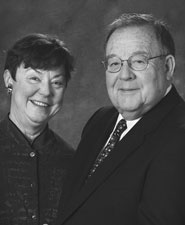You are here: Home: PCU 1|2005: H Jeoffrey Deeths, MD and Mrs Lenore Deeths
| H Jeoffrey Deeths, MD and Mrs Lenore Deeths |
EDITED COMMENTS |
 A urologist’s initial reaction to a prostate cancer diagnosis A urologist’s initial reaction to a prostate cancer diagnosis
In 1997 I was diagnosed with prostate cancer, Gleason Grade 2+3. The news devastated me, even though the tumor was low grade. Upon diagnosis, most cancer patients feel they are going to die, and although I had treated and reassured many men with prostate cancer over the years, it was different being the patient. The cancer itself bothered me more than the treatment. I decided on radical prostatectomy, which my partner performed a month later.
I always told my own patients that the treatment decision was theirs because it was their life, but I strongly feel that I made a mistake in not discussing it with my wife so that she could understand why I made that decision. Subsequently, I insist that my patients have their spouse present during discussions so that both will know what is happening.
Transitioning from diagnosis through surgery to recovery
In retrospect, the first few months were difficult. I was unable to look ahead or anticipate anything in the future. I lived one day at a time, and went back to my routine of seeing patients. I was depressed after the surgery, though not clinically depressed. I didn’t buy any new clothes for about six months; I felt it would be money wasted because I thought I was going to die. Four months after surgery I had a heart attack, a second life-threatening event that compounded these feelings. Although I am now back on my feet, sometimes I still feel depressed. I don’t know if that is from realizing that I am not going to live forever or just normal aging.
Effect of prostate cancer on intimacy
The prostate cancer diagnosis and subsequent events made our marriage stronger in many ways. The intimacy and closeness with my wife has increased over time and we are more in tune with each other. What helped in this respect were the changes we made to our lifestyle. Six months ago I retired. Now, we have more time and we do a lot more together.
Managing the side effects of prostate cancer surgery
After the surgery, I experienced incontinence and impotence, which were far more life altering than I imagined, even though I had previously treated many patients with these problems and advised them of various ways to control them. As an adult, I found it to be a significant event whenever I wet my pants or the bed. I used all the protection available and wore a very light day pad for a couple of years. The incontinence gradually improved and is no longer an issue.
Mrs Deeths’ perspective
When I learned of his diagnosis, he had already decided on radical surgery. I felt left out because he didn’t consult me about any part of it. I wanted to research the subject and consider other treatment methods. I wanted a second opinion about surgery because controversy still exists in this area. I was angry that he chose surgery for such a low-grade cancer when other, less drastic approaches were available. I thought if he hadn’t undergone surgery, he would not have had the problems of incontinence and impotence.
I was less supportive than his nurse and I was having a hard time trying to keep my life together. My father died from prostate cancer, and that was on my mind. Jeff knew more than I did, and his being so stressed made me believe it was worse than I thought. That devastated me and left me with no reserve. After the surgery, he still projected the attitude that he was going to die, so I questioned the usefulness of the surgery.
When Jeff had his heart attack, he was talking about possibly dying. That was the turning point in this crisis for both of us. It takes something traumatic to make you understand that there’s another side to life. I used yoga and humor to cope. It was ironic that it happened on Valentine’s Day. Our dinner plans that day were cancelled, and on the following day I brought dinner, flowers and wine to the hospital room.
Despite protests from the nurse, we dined there together. That whole episode put some humor back into my life and brought us a new perspective — that life is transient and tomorrow may not exist, so we should live in the present, appreciating the moment. Subsequently, we decided to simplify our lives by proceeding with our plans to sell the house and move somewhere that required lower maintenance. We now enjoy a different lifestyle and do more together.
Those first six months were very difficult. Any spouse who is severely impacted needs confidence building, and their needs should be addressed. My advice to the spouse is to reach out to immediate and extended family for support and take a positive attitude. Look back on your life to another stressful event that you lived through, and believe that somehow this too will pass. There is more to life than sex. Look at the entire picture, value life and take it day by day.
 |
| Dr Deeths is an Associate Clinical Professor of Urology at Creighton Medical School in Omaha, Nebraska. |
|

